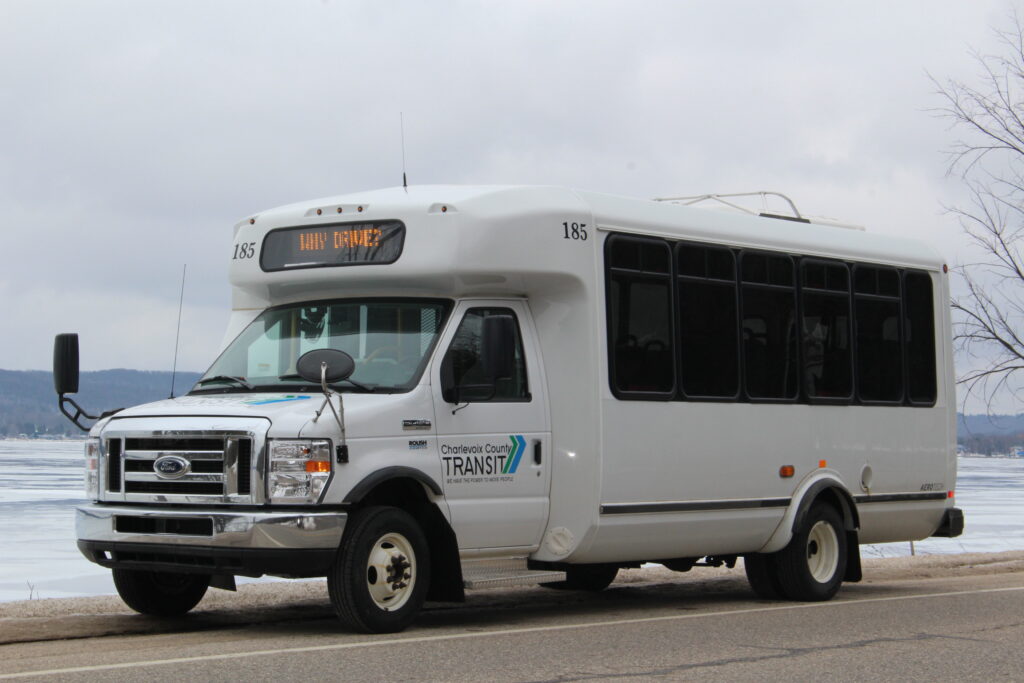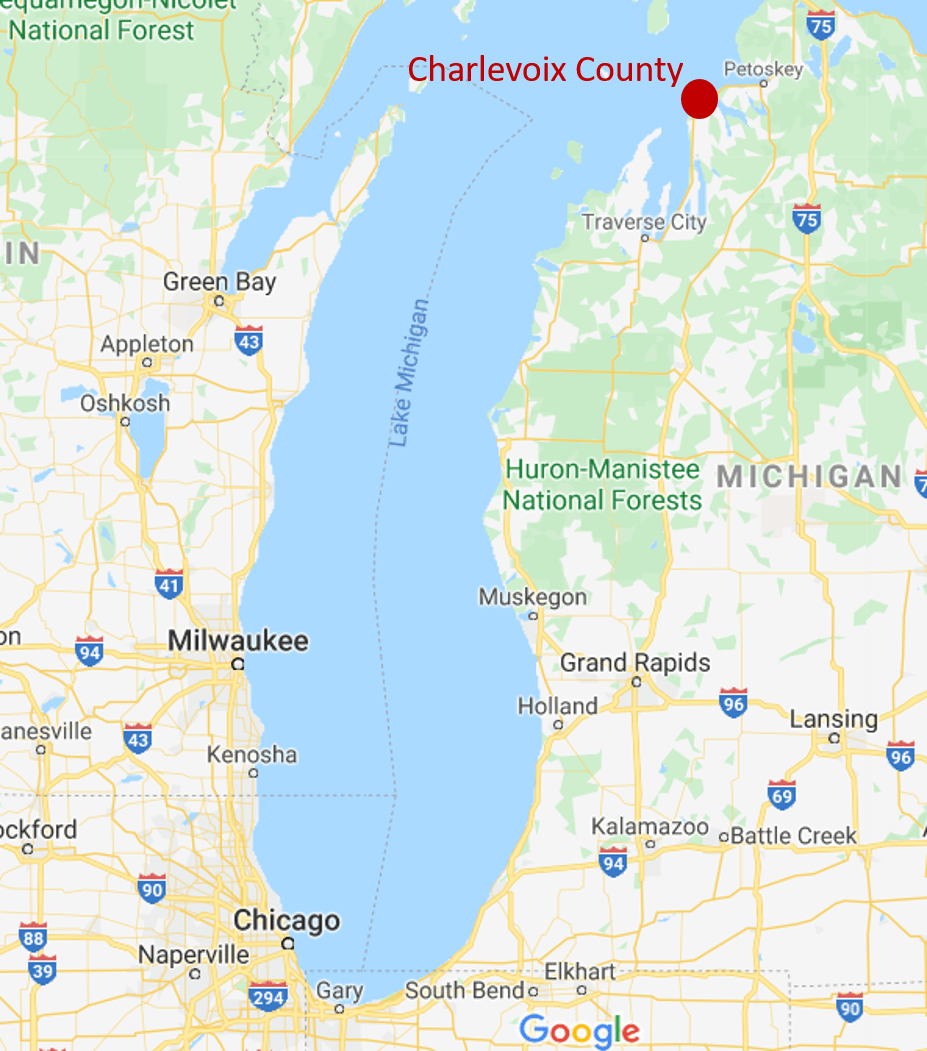Charlevoix, MI Rural Food Delivery Program
20 minutes Author: Al Benedict, Shared-Use Mobility Center; Todd Hansen, Texas A&M Transportation Institute Date Launched/Enacted: Aug 5, 2020 Date Published: August 5, 2020

This case study is part of a larger review of Public Transit Food Delivery Programs that have popped-up across the country in response to COVID-19. The Charlevoix County Transit (CCT) example below offers a rural perspective and a complimentary case study featuring the Denver Regional Transportation District (RTD) looks at transit deliveries from an urban context.
—
Brief Summary
- Charlevoix County Transit (CCT), a rural agency in northern Michigan, began delivering food, prescriptions, mail, and packages to at-risk residents during the COVID-19 pandemic. The project allowed the agency to provide valuable services to the most vulnerable community members and keep transit operators and staff employed even as bus ridership fell drastically.
- Of the 5,246 trips made between April and June 2020, 34% were deliveries, the vast majority of which were frozen meals.
- CCT faced several obstacles in implementing this program, including technological barriers faced by users and coordination issues between the agency, local stores, and volunteers.
- CCT hopes to continue this service going forward, even after ridership returns to pre-pandemic levels. The agency is exploring more funding options and ways to address operational challenges.
Introduction
Small town and rural transit agencies are stepping up to fill an important role of essential services during the pandemic. In addition to maintaining existing transit service, Charlevoix County Transit (CCT), located in northern Michigan, now offers a range of services including food, prescription, mail, and package delivery. Charlevoix County sits along the shores of Lake Michigan with a population of 26,000 and is a popular tourist destination in the summer—referred to as the mainland by area residents. CCT also serves Beaver Island and its 400 residents just off the shore of Charlevoix County. The nature of a rural area can sometimes pose challenges for coordinating passenger trips given the distance between its users and the distance that they must travel. At the same time, rural transit agencies throughout the U.S. are providing essential services beyond passenger trips during the COVID-19 crisis and given their smaller size can sometimes adapt much quicker as they respond to the immediate and ongoing needs of the community.

Charlevoix County, Michigan
Goals and Outcomes
According to the Centers for Disease Control and Prevention, populations aged 85 or older face the greatest risk for severe illness from COVID-19. Eight-out-of-ten U.S. COVID-19 deaths have been reported in adults 65 years and older. While underlying factors heighten this risk, the danger is clear: the lockdown, combined with people traveling less as well as limited availability and resources, added to the need to provide essential services to the elderly and most at-risk populations. As ridership dropped nearly 80% because the general population was working from home more and traveling less, CCT was well positioned to meet these needs. The delivery services offered an opportunity to serve the community and keep bus drivers and other transit staff employed.
Operations and Marketing
Operations
On the Mainland, CCT operates 12 cutaway buses that seat 14-16 passengers, all wheelchair accessible and varying number of securement locations. CCT has one cutaway bus with no lift that seats 22 passengers as well as two full size vans and two MV-1 vans. During the height of the COVID crisis in Spring 2020, CCT only ran five vehicles per day, and it rotated the use of the vehicles from week-to-week so all of them had some miles put on them throughout the initial stay-at-home order. Only the cutaway buses were used during that time for better social distancing.
With the reopening of the state, CCT now operates six cutaway buses daily for its demand-response service and either a cutaway or one of the full size vans for medical transportation.
On Beaver Island, CCT has one cutaway bus that seats 12 passengers and a full size van. CCT has been rotating the use of those two vehicles on a regular basis to evenly distribute the mileage between them.
Between April 1 – June 30, 2020 CCT made 5,246 trips. Of these, 34% were deliveries, with frozen meal deliveries in particular representing the highest concentration of trips at 1,466. CCT estimates that it delivered 8,250 Commission on Aging (COA) meals from the end of March through the end of June alone. The following chart shows the breakdown of delivery trips made by CCT during that time period.
The delivery program started with food delivery for children who would have otherwise received meals through school and through a partnership with the Commission on Aging, assisting with delivery of senior meals. While the school/student delivery saw minimal use, the senior meal program deliveries grew from a few meals picked up during COA’s Curbside Service to a full delivery service when the State’s Stay At Home Order was enacted. The initial aim was to deliver a week’s supply of frozen meals to the elderly; COA opened the meal delivery to any senior resident (not just those who were Home Delivered Meal eligible). From there, the delivery program grew along with the community’s need as the pandemic threatened its most vulnerable populations.
CCT uses its fleet of cutaway buses for deliveries while concurrently providing transit trips in the same vehicles. The larger buses allow for proper social distancing between passengers and the vehicle operators. Currently the only way that CCT can deliver groceries is if the individual uses the local grocery store’s mobile app, as the local stores are unable to take phone orders. Prescriptions are handled in a similar manner. Most pharmacies will have the prescription waiting in the front of the store for the CCT driver after they provide some basic verification.
Given the target demographic for the delivery service, many of the people that need food deliveries do not have access to nor do they feel comfortable using mobile technology. These presented a set of challenges that CCT is working to mitigate. Among the solutions that CCT tried, was working with a local church to see if volunteers could do the shopping. Because that too proved challenging, CCT has begun the process of creating a shopping/delivery program in partnership with the county’s Commission on Aging. CCT is also working with Routematch, its scheduling and dispatch vendor, to see if payment for the groceries can be made through the scheduling platform. Initial conversations are promising and it looks like CCT may soon be able to pay for the groceries on behalf of their residents and then process the payment through Routematch.
The new shopping program would utilize a transit staff who will take the grocery order via phone from the resident requesting assistance and then that person would go to the store and do the shopping. CCT would create a verification form that the individual signs stating that the items received were correct and authorizing that funds be deducted from their Routematch pay account for the purchase. The customer would receive the original receipt and CCT would keep a copy for its own records.
The residents of Beaver Island, just off the shore of Charlevoix County, faced similar challenges during the pandemic so the food delivery program was extended to also serve its residents. Package and mail delivery to the elderly and other at risk populations is also done on the island. Residents on Beaver Island using the Michigan Bridge food assistance program also have access to CCT’s delivery program. The driver picks up the Bridge Card one day, drops it off with a shopping list (or the resident calls), and then the store has the groceries ready for pick up the next day. CCT is exploring how to extend the Bridge food assistance service to the mainland recognizing that it will need to put some additional safeguards in place so that the card is not used fraudulently.
CCT operates Monday through Friday; its Saturday service was suspended due to the decline in ridership with COVID-19. The deliveries are staggered by day of the week for each community in the county. Given the delivery service is paired with transit trips and ridership is down as a result of the pandemic the delivery service did not cut into its passenger service.
Marketing
The delivery service is marketed through a combination of word-of-mouth and CCT’s partnership with the Commission on Aging and local Chamber of Commerce newsletters. CCT advertised its delivery services during the Stay and Home Order and the program was also promoted through interviews, social media posts, and a press release.
Budget and Planning
CCT’s delivery service is provided fare free to users. The program is funded through the emergency CARES Act from the Federal Transit Administration (FTA) and through its partnership with the Commission on Aging. Michigan has been granted a waiver from FTA to continue its delivery service through the middle of January and count those trips as eligible expenses. CCT is exploring other opportunities to fund the program in the advent the CARES Act is not extended because it sees it filling an important need. CCT’s budget is made up of passenger/contract fares, local funds (including a countywide millage), state and federal funds.
Ridership has increased from its 80% decline during the initial Stay at Home Order to a 60% decline. This increase in ridership offers the opportunity to further pair its delivery service with transit trips.
Accessibility
All vehicles are accessible and the delivery service is combined with passenger trips. The program is aimed at serving the elderly and persons with disabilities, but anyone can utilize the service and users do not need to go through an eligibility process.
Challenges and Lessons
With varying distances between the grocery stores and where people live, offering a food delivery program in a rural area can pose several obstacles.
People needing food delivery assistance can only do so if they use the local stores’ mobile app. However, many seniors and at-risk populations do not have access to mobile technology and may not be familiar using apps. Second, local stores do not have the staff capacity to do the shopping for online orders. CCT tried several different approaches, including trying to work with local church volunteers, but those solutions proved difficult given the level of coordination that needed to occur between the volunteer, CCT staff, the transit driver, and the person seeking food assistance. To address these issues CCT is working to build on its partnership with the Commission on Aging, taking delivery orders over the phone, and building the capacity to pay for delivery orders through their scheduling and dispatch software.
Touched on in the Operations and Marketing section of this case study, individuals paying for their groceries using the Michigan Bridge food assistance program required additional coordination, as the CCT driver needs to pick-up the Bridge card prior to making the purchase so that it can be used to pay for the groceries at the store. Not an insurmountable problem, but it does require an extra step to offer the service. The prescription deliveries were not an issue, as most of the pharmacies have worked with CCT staff and have the prescription orders ready at the front of the store so that the driver can pick it up and more quickly return to their route.
Future Plans
CCT sees this as an ongoing program for its community and will look for more local funding options should state/federal agencies deem delivery as an ineligible service. There are currently no limitations on the number or size of deliveries and if possible CCT would like the program to remain affordable and flexible to meet the needs of its users. If another Stay at Home Order is issued, CCT is well positioned to continue and potentially expand the service if needed to support the community. Similarly, if COVID-19 subsides and a vaccine are found, ridership will likely resume to pre-COVID-19 levels, but there may still be a need for certain populations to have access to a delivery service to meet their basic needs. CCT is working on addressing the challenges that it had to overcome to provide this service and is looking into what needs to happen to make this a permanent program for the agency.
Conclusions
Rural agencies across the country are stepping up to provide essential services to their community residents and in many cases the nature of a smaller transit agency lends itself to an “all hands on deck” approach to first identify and then establish a program or set of programs to meet that need. Jill Drury, CCT’s Executive Director, has assisted with senior meal deliveries and if CCT starts the shopping program, will assist with that program where needed. In the month of June, CCT provided over 500 food and prescription deliveries. Depending on the progression of COVID-19, those deliveries will likely increase or decline, but the basic need for providing these essential services to the most vulnerable populations will likely continue on some level.
Acknowledgements
A special thank you to Jill Drury, Charlevoix County Transit Executive Director, for her time and sharing information about CCT’s delivery programs.
